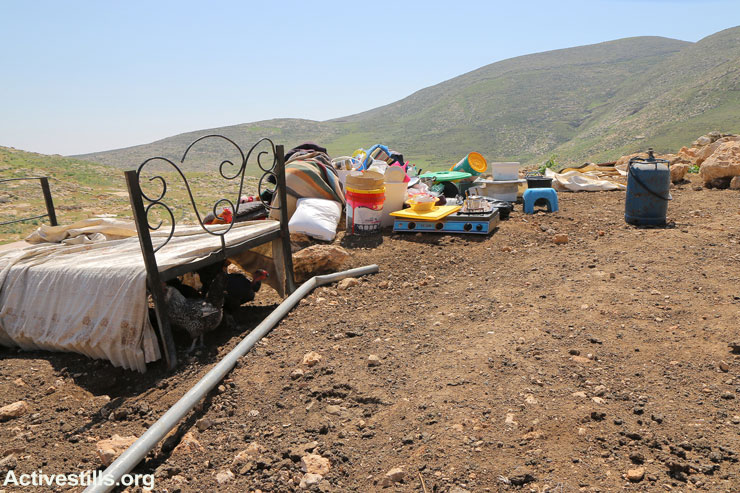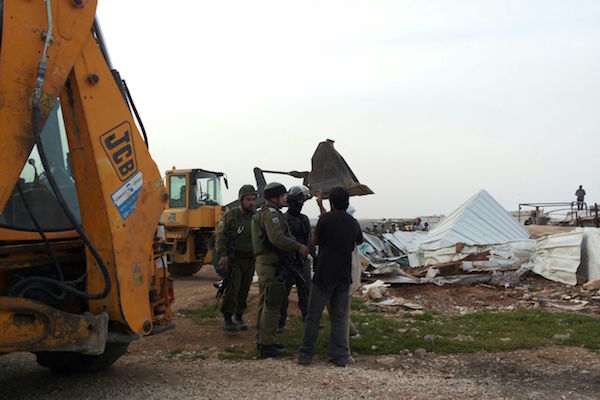Senior army officer testifies to Knesset committee that building enforcement is ‘far more severe against Palestinians’ than Jews. There are over 11,000 Israeli demolition orders pending against Palestinian-owned structures.

The Israeli army demolishes Palestinian homes in the West Bank at disproportionately higher rates than it demolishes Jewish settler homes, a senior Israeli army officer told a Knesset sub-committee on Wednesday. The admission demonstrates yet another way in which Jews and Palestinians are held to different legal standards, and often different legal systems in West Bank.
“Our enforcement against Palestinians is hundreds of percentage points higher [than against Jews],” Maj.-Gen. Yoav ‘Poli’ Mordechai told the Knesset Sub-Committee for Judea and Samaria (West Bank) Affairs.
Mordechai, who serves as the IDF Coordinator of Government Activities in the Territories (COGAT), a position that is effectively the military governor of the West Bank, was addressing a perception by settlers that Israeli authorities single them out when it comes to enforcement against illegal building.
In January of this year U.S. Ambassador to Israel Dan Shapiro said that, “at times there seem to be two standards of adherence to the rule of law: one for Israelis and another for Palestinians.” Israeli Prime Minister Netanyahu at the time called Shapiro’s remarks “unacceptable and incorrect.”
And yet back at the Knesset sub-committee on Wednesday, Mordechai reiterated that, “enforcement is not only equal, it is far more severe against Palestinians in recent years,” carefully placing responsibility for the discriminatory policies on the Israeli political echelon.
“The officers in the IDF’s West Bank legal advisor’s unit act according to the directives of the generals, who act according to the directives of the Chief of General Staff, who acts according to the directives of the defense minister,” Mordechai said.
The COGAT head went on to explain why he would not give exact figures about how many Jewish versus Palestinian homes the army demolishes.
“Because it affects foreign policy we decided, and I think it is the right decision, to only present those numbers in a closed forum,” he said at the sub-committee meeting.
The prosecutor of the International Criminal Court is currently conducting a preliminary examination into the situation in Palestine. Settlements and home demolitions are known to be a part of the prosecutor’s examination, which might help explain why the Israeli army is disinclined to release exact figures about the discriminatory nature of home demolitions in the occupied territories.

According to the United Nations, there are an estimated 11,000 demolition orders pending against Palestinian-owned structures in Area C of the West Bank, the 60-percent of the occupied territory over which the Israeli army exercises full administrative control. Almost all Israeli settlements are located in Area C.
Earlier this year, the army demolished 235 Palestinian-owned structures, displacing 331 Palestinians (including 174 children) in a single month, the highest monthly total in at least seven years.
Jewish settlers in the West Bank have their own planning mechanisms, albeit subject to approval from the army. Palestinians, meanwhile, have no planning mechanisms at their disposal and must approach the occupying army for permission to build even on their own privately owned land.
That system results in a situation in which less than 1 percent of Area C is zoned for Palestinian use, we reported last year: 94 percent of requests by Palestinians for building permits are rejected; approximately 70 percent of Palestinians in Area C live in unrecognized villages, and thus are not connected to a water supply or have proper sewage infrastructure.
Many demolitions of Palestinian homes are also conducted under the pretense of the army needing the areas for military training. Large swathes of the West Bank, particularly in the Jordan Valley and South Hebron Hills have been declared live-fire zones by the IDF, a designation the army then uses in order to remove Palestinian residents. Jewish settlers are almost never affected by such orders.
In 2014, a senior IDF officer admitted in a Knesset committee meeting that the army uses live-fire zones as a method for displacing Palestinians from areas in which it does not want them, or in other words, for political purposes.
Since the occupation of 1967 began, Israel has demolished more than 28,000 Palestinian-owned structures, according to a report by the Israeli Committee Against House Demolitions (ICAHD).
The Israeli army demolished six Palestinian homes in the unrecognized Palestinian village of Umm el-Kheir Wednesday morning, according to Israel human rights group B’Tselem. The shelters had been donated by the humanitarian aid organization CHF International following a previous home demolition in the small village that left several families homeless.


